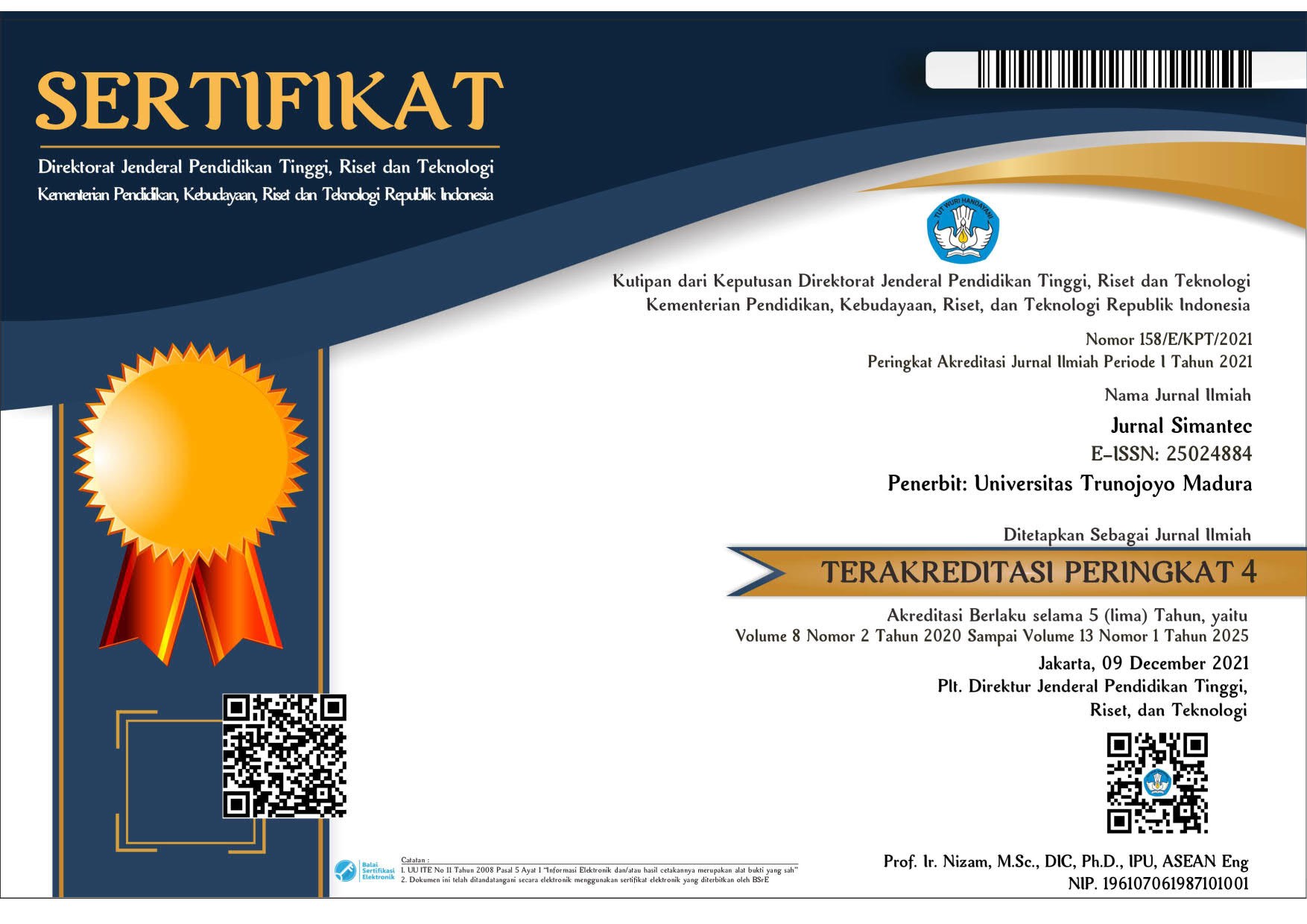STUDENT PERCEPTIONS OF LMS AT THE FACULTY OF ENGINEERING TRUNOJOYO UNIVERSITY MADURA
Abstract
This study aims to determine student perceptions of the Learning Management System (LMS) during the Corona pandemic. Currently, many educational institutions are conducting online learning and using LMS in their activities. The LMS system is used as a medium for managing the learning process. By utilizing the LMS, schools can register, identify lesson plans, monitor learning, and evaluate learning. During the pandemic learning period, LMS plays a very important role in determining the success of learning targets. It is therefore important to get students' perceptions of the LMS used. The LMS system used in this study is a free web-based LMS system and can be used by the public. The assessment methodology used to fulfill the research objectives uses a Likert-type scale. This study provides insight into the LMS preferred by students. The results of this study can be used as a reference in the selection of the LMS tool used. The method we use is a simple questionnaire using a google form. This research is included in quantitative research. From the results of the research, it is evident that there are two things that are of great concern to students, namely the LMS is easy to use and is able to facilitate the availability of teaching materials. Respectively with a total agree of 86.8% and 93.3%.
Full Text:
PDF (Bahasa Indonesia)References
Unesco, “COVID-19 impact on education.” https://unesdoc.unesco.org/ark:/48223/pf0000380398.
I. Almarashdeh, “Sharing instructors experience of learning management system: A technology perspective of user satisfaction in distance learning course,” Comput. Human Behav., vol. 63, pp. 249–255, Oct. 2016, doi: 10.1016/j.chb.2016.05.013.
J. A. Moreira, S. Henriques, M. De Fátima Goulão, and D. Barros, “Digital Learning in Higher Education: A Training Course for Teaching Online - Universidade Aberta, Portugal,” Open Prax., vol. 9, no. 2, p. 253, Apr. 2017, doi: 10.5944/openpraxis.9.2.539.
M. A. Camilleri and A. C. Camilleri, “The Acceptance of Learning Management Systems and Video Conferencing Technologies: Lessons Learned from COVID-19,” Technol. Knowl. Learn., Aug. 2021, doi: 10.1007/s10758-021-09561-y.
M. S. Abdullah, M. Toycan, and K. Anwar, “The cost readiness of implementing e-learning,” Custos E Agronegocio Line, vol. 13, no. 2, pp. 156–175, 2017.
B. Bervell, P. Nyagorme, and V. Arkorful, “LMS-Enabled Blended Learning Use Intentions among Distance Education Tutors: Examining the Mediation Role of Attitude Based on Technology-Related Stimulus-Response Theoretical Framework (TR-SR-TF),” Contemp. Educ. Technol., vol. 12, no. 2, p. ep273, Jun. 2020, doi: 10.30935/cedtech/8317.
S. A. Raza, W. Qazi, K. A. Khan, and J. Salam, “Social Isolation and Acceptance of the Learning Management System (LMS) in the time of COVID-19 Pandemic: An Expansion of the UTAUT Model,” J. Educ. Comput. Res., vol. 59, no. 2, pp. 183–208, Apr. 2021, doi: 10.1177/0735633120960421.
A. Garone et al., “Clustering university teaching staff through UTAUT: Implications for the acceptance of a new learning management system,” Br. J. Educ. Technol., vol. 50, no. 5, pp. 2466–2483, Sep. 2019, doi: 10.1111/bjet.12867.
K. Holmes and E. Prieto-Rodriguez, “Student and staff perceptions of a learning management system for blended learning in teacher education,” Aust. J. Teach. Educ., vol. 43, no. 3, pp. 21–34, 2018, [Online]. Available: https://search.informit.org/doi/10.3316/informit.477648976239419.
L. C. Guzman-Arias, J. Solis-Cespedes, and A. Francesa-Alfaro, “Exploring Mobile UX/UI for an OER Repository Search Engine Integrated to an LMS,” in 2019 XIV Latin American Conference on Learning Technologies (LACLO), Oct. 2019, pp. 55–62, doi: 10.1109/LACLO49268.2019.00020.
T. G. Sakova and S. A. Chevereva, “Fundamentals of Choosing an LMS Platform for Distance Learning,” 2021, pp. 348–353.
A. Krouska, C. Troussas, and M. Virvou, “Comparing LMS and CMS platforms supporting social e-learning in higher education,” in 2017 8th International Conference on Information, Intelligence, Systems & Applications (IISA), Aug. 2017, pp. 1–6, doi: 10.1109/IISA.2017.8316408.
E. Mishchenko, “LMS Technical Analysis: problems of choice,” E3S Web Conf., vol. 244, p. 07005, Mar. 2021, doi: 10.1051/e3sconf/202124407005.
H. Taherdoost, “What Is the Best Response Scale for Survey and Questionnaire Design; Review of Different Lengths of Rating Scale / Attitude Scale / Likert Scale,” Int. J. Acad. Res. Manag., vol. 8, no. 1, pp. 1–10, 2019, [Online]. Available: https://ssrn.com/abstract=3588604.
E. Dahlstrom, D. C. Brooks, and J. Bichsel, “The current ecosystem of learning management systems in higher education: Student, faculty, and IT perspectives,” 2014.
DOI: https://doi.org/10.21107/simantec.v10i2.14652
Refbacks
Copyright (c) 2022 Mochammad Kautsar Sophan, Kurniawa Eka Permana
Indexed By
.png)

11.png)













